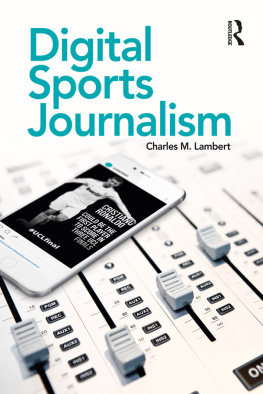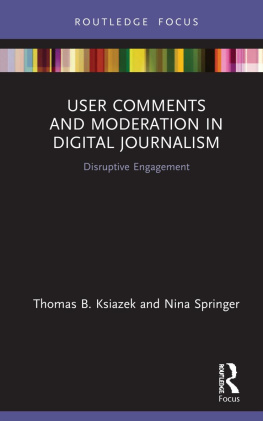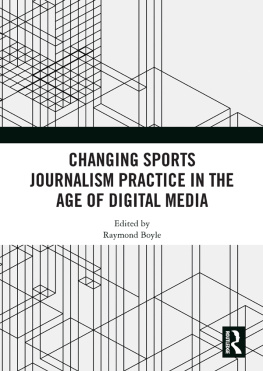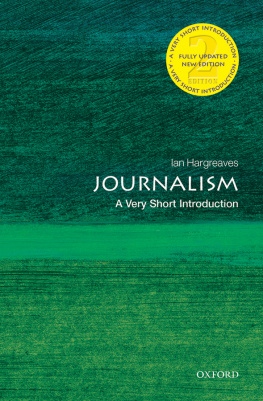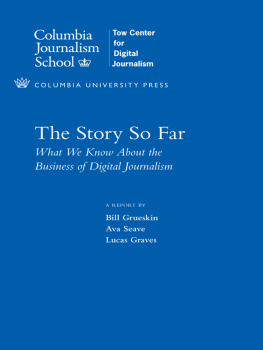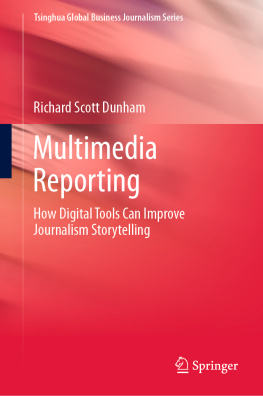
Entrepreneurial Journalism
Entrepreneurial Journalism explains how, in the age of online journalism, digital-savvy media practitioners are building their careers by using low-cost digital technologies to create unique news platforms and cultivate diverse readerships. The book also offers a range of techniques and tips that will help readers achieve the same. Its opening chapters introduce a conceptual understanding of the business behind entrepreneurial journalism. The second half of the book then presents practical guidance on how to work successfully online.
Topics include:
- advice on launching digital start-ups;
- how to use key analytics to track and focus readership;
- engaging with mobile journalism by utilising smartphone and app technology;
- developing revenue streams that can make digital journalism sustainable;
- legal and ethical dilemmas faced in a modern newsroom;
- the challenges of producing news for mobile readers.
The book features leading figures from the BBC, Google and the Guardian, as well as some of Britains best entrepreneurial reporters, who offer advice on thriving in this developing media landscape. Additional support comes from an online resource bank, suggesting a variety of free tools to create online news content.
Entrepreneurial Journalism is an invaluable resource for both practising journalists and students of journalism.
Paul Marsden lectures at Leeds Trinity University, UK. He specialises in online journalism, teaching trainee journalists how to build news websites, use technology to tell stories in innovative ways and utilise social platforms to build an audience and generate income from digital reporting.
For additional resources related to Entrepreneurial Journalism, please visit startupjournalism.co.uk
First published 2017
by Routledge
2 Park Square, Milton Park, Abingdon, Oxon OX14 4RN
and by Routledge
711 Third Avenue, New York, NY 10017
Routledge is an imprint of the Taylor & Francis Group, an informa business
2017 Paul Marsden; individual contributions, the contributors
The right of Paul Marsden to be identified as author of this work has been asserted by him in accordance with sections 77 and 78 of the Copyright, Designs and Patents Act 1988.
All rights reserved. No part of this book may be reprinted or reproduced or utilised in any form or by any electronic, mechanical, or other means, now known or hereafter invented, including photocopying and recording, or in any information storage or retrieval system, without permission in writing from the publishers.
Trademark notice: Product or corporate names may be trademarks or registered trademarks, and are used only for identification and explanation without intent to infringe.
British Library Cataloguing in Publication Data
A catalogue record for this book is available from the British Library
Library of Congress Cataloging in Publication Data
Names: Marsden, Paul, 1984-
Title: Entrepreneurial journalism : how to go it alone and launch your dream
digital project / Paul Marsden.
Description: London ; New York : Routledge, 2017. | Includes bibliographical
references and index.
Identifiers: LCCN 2016030691| ISBN 9781138190351 (hardback : alk. paper)
| ISBN 9781138190368 (pbk. : alk. paper) | ISBN 9781315641096 (ebook)
Subjects: LCSH: Journalism--Management. | Journalism--Vocational
guidance. | Online journalism. | Journalism--Technological innovations.
Classification: LCC PN4784.M34 M34 2017 | DDC 070.4068--dc23LC
record available at https://lccn.loc.gov/2016030691
ISBN: 978-1-138-19035-1 (hbk)
ISBN: 978-1-138-19036-8 (pbk)
ISBN: 978-1-315-64109-6 (ebk)
Typeset in Bembo by
Servis Filmsetting Ltd, Stockport, Cheshire
Contents
Wayne Bailey teaches across a number of professional education programmes and specialises in higher education practice and business enterprise in education. His research is particularly focused on the internationalisation agenda and the impact this has on teaching within the higher education sector today. Effective HE marketing in both home and international markets is also a key focus of his research.
Lindsay Eastwood joined Leeds Trinity University in 2008 after working as a journalist for eighteen years in both print and broadcast media. She has been a reporter at the Craven Herald, Watford Free Observer, Yorkshire Evening Post and ITV Yorkshire. She now teaches news writing and video journalism skills.
Nigel Green began his career as a trainee journalist on the Sheffield Star in 1985. He has since worked for a wide range of national and regional newspapers, as well as ITV Tyne Tees. Nigel specialises in crime and investigative reporting but has also covered assignments in war zones, including Afghanistan and Iraq. He is currently an Associate Principal Lecturer at Leeds Trinity University, where his main role is teaching media law.
Catherine OConnor is Head of the School of Arts and Communication at Leeds Trinity University. Prior to joining the university she worked as a journalist in the regional news media, including the Halifax Courier, Yorkshire Evening Post and Telegraph & Argus , where she was Deputy Editor.
Rebecca Whittington was a reporter, news editor, editor and video journalist for some of Yorkshires top newspaper and digital titles, including the Yorkshire Post and Yorkshire Evening Post , before joining Leeds Trinity University as a graduate teaching assistant in journalism and embarking on a Ph.D. measuring the impact and efficacy of digital reporting tools in regional UK newsrooms.
Andrew Youde is Head of Division (Academic and Professional Studies) in the School of Education and Professional Development at the University of Huddersfield. Before taking up this post he was Head of A-Level Business and Economics at Huddersfield New College.
This book is the product of a years worth of research, which wouldnt have been possible without Leeds Trinity University giving me the time to write it. For that I owe my boss, Catherine OConnor, and my colleagues, who have either contributed, offered to proofread or covered aspects of my teaching, a considerable amount of gratitude.
Thank you to Karla, Talor, Haydn and Richard for putting up with me for the last few months while I completed it and Frances for her help pulling it all together. Thank you to Trinity Mirror, the Reuters Institute for the Study of Journalism and The Lincolnite for letting me use images of their work. I should make it clear that this book is not affiliated with nor supported by Apple.
Finally, thanks to all the contributors including Dan Evans and Josh Stead for their input and interviewees who have added their expertise to the project.
Paul Marsden, June 2016
There has never been a better time to be a young journalist. And this is why.
Traditionally journalism graduates had their future mapped for them. They would leave university and progress to trainee roles in large news organisations, as I did myself in 2005, and they would progress within that structure.
As a trainee in a regional newspaper you were told in several years you could become a senior reporter, then possibly a specialist reporter or a sub, then maybe a news editor and possibly even one day the editor.


